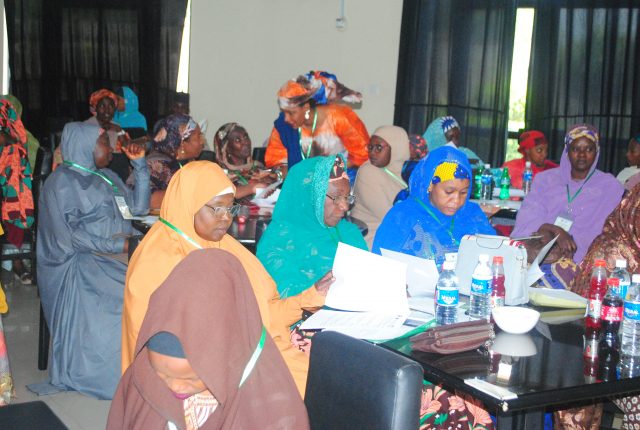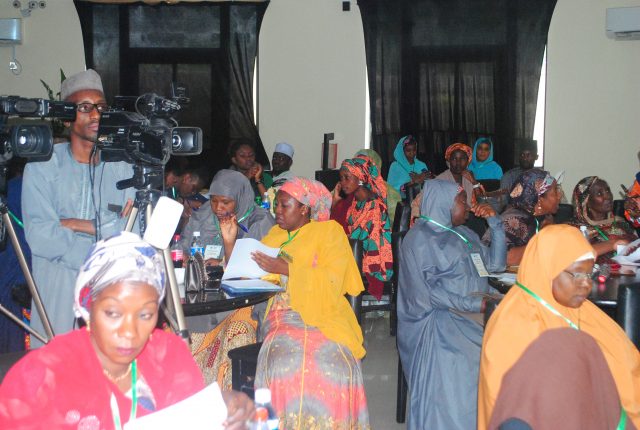
According to the Council on Foreign Relations and the McKinsey Global Institute, “Nigeria’s gross domestic product (GDP) could grow by 23 percent—or $229 billion—by 2025 if women participated in the economy to the same extent as men.” However, limited access to finance remains a major challenge that prevents women from fully participating in the economy. To reduce these barriers, CIPE supported the Nigerian Association of Chambers of Commerce, Industry, Mines, and Agriculture’s (NACCIMA) Business Women Group (NAWORG) to lead an advocacy campaign that encourages key government officials and commercial banks to increase access to finance by simplifying the loan application processes and increasing transparency of the loan approval process.

During this campaign, NAWORG collaborated with the Association of Nigerian Women Business Network (ANWBN), a coalition of 18 businesswomen associations, to organize three multi-stakeholder roundtable meetings in Ibadan (Oyo State), Owerri (Imo State) and Kano (Kano State). During the stakeholder meetings, participants identified the barriers for women to access loans and brainstormed concrete policy recommendations to improve the enabling environment for women in business. As a result of these roundtable discussions, NAWORG developed a policy paper that outlines key recommendations policymakers and financial institutions should consider in order to improve access to finance for women entrepreneurs across Nigeria. The recommendations were also informed by the data collected by NAWORG in 2018. Some of the policy recommendations include:
- The Federal Ministry of Finance and the National Assembly should increase access to finance for women entrepreneurs by requiring banks to simplify and streamline the loan application process.
- The Federal Ministry of Finance should work with financial institutions to provide single-digit interest rates for loans given to women entrepreneurs.
- The Central Bank of Nigeria and other financial institutions should facilitate capacity building workshops to ensure women entrepreneurs understand how to apply for loans to start or upscale a business.
- The Central Bank of Nigeria should regularly monitor the success rate of how many women receive loans and provide this information to the general public.
- Financial institutions should disburse funds no later than one month after recipients meet all requirements needed to justify the need for the loan.
Alongside the campaign, NAWORG, in collaboration with ANWBN and financial institutions, organized three financial literacy workshops to build the capacity of women entrepreneurs to apply for four main types of loans available for women entrepreneurs. These loans were: the Agri-Business, Small and Medium Enterprises Investment Scheme (AGSMEIS) distributed by the First Monument Bank (FCMB), the W Power Loan distributed by Access Bank, the Murabaha loan distributed by JAIZ bank, and the Micro Saving Loan distributed by Eco Bank International. As a result, numerous women entrepreneurs applied for loans following each workshop. Following the financial literacy workshop in Oyo State, at least 15 women entrepreneurs applied for various loans, such as the W-Power loan. After the financial literacy workshop in Imo State, at least five women entrepreneurs applied for various loans, such as the W-Power loan and AGSMEIS loan. Finally, following the financial literacy workshop in Kano State, at least 28 women entrepreneurs applied for loans, such as the Micro-Saving loan. Building upon this momentum, NAWORG and ANWBN are encouraging banks to continue delivering financial literacy workshops for women entrepreneurs across Nigeria.
Although the financial literacy workshops provided support for women to apply for loans, several barriers still remain for women to receive funds to start or upscale a business. To this end, NAWORG and ANWBN have committed to continue advocating for the above recommendations that seek to expand access to finance for women across Nigeria. For instance, ANWBN is currently in the process of updating its Women’s National Business Agenda (WNBA), to help improve the overall enabling environment for women in business (read more about WNBAs here). In the updated draft of the WNBA that is set to be finalized over the next month, ANWBN highlights the main findings and policy recommendations produced under this campaign that seek to improve access to finance for women in business.
Created in 1960, the Nigerian Association of Chambers of Commerce, Industry, Mines and Agriculture (NACCIMA) is the umbrella organization for member chambers throughout the country. Through voluntary membership, the Association champions the voice of business and promotes public policies that promote free enterprise. Since 2005, the NACCIMA Women Group (NAWORG) has served as a trade group that facilitates women’s participation in commerce and governance and helps members access loans and identify market opportunities.
Published Date: March 18, 2020